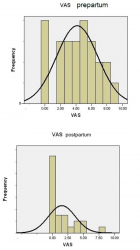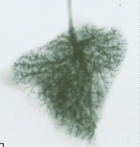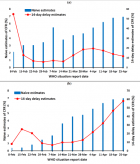Abstract
Case Report
High suspicion of paradoxical embolism due to atrial septal Defect: A rare cause of ischemic stroke
Zahide Betul Gunduz* and Turgut Uygun
Published: 30 December, 2020 | Volume 4 - Issue 2 | Pages: 084-087
Atrial septal defect (ASD) is common among adult congenital heart diseases but rarely causes paradoxical cerebral embolism. By sharing the ASD diagnosed after the first ischemic stroke attack at the age of 49 and a case of paradoxical cerebral embolism developing accordingly, we aimed to draw attention to the necessity of detailed cardiac examination in patients with cryptogenic stroke.
Read Full Article HTML DOI: 10.29328/journal.jnnd.1001040 Cite this Article Read Full Article PDF
Keywords:
Atrial septal defect; Paradoxical embolism; Ischemic stroke; Congenital heart disease; Cerebrovasculer disease
References
- Esenwa C, Gutierrez J. Secondary stroke prevention: challenges and solutions. Vasc Health Risk Manag. 2015; 11: 437-450. PubMed: https://pubmed.ncbi.nlm.nih.gov/26300647/
- Yaghi S, Bernstein RA, Passman R, Okin PM, Furie KL, et al. Cryptogenic Stroke: Research and Practice. Circ Res. 2017; 120: 527-540. PubMed: https://pubmed.ncbi.nlm.nih.gov/28154102/
- Lippmann H, Rafferty T. Patent foramen ovale and paradoxical embolization: a historical perspective. Yale J Biol Med. 1993; 661: 11-17. PubMed: https://pubmed.ncbi.nlm.nih.gov/8256459/
- Fang ZF, Tang L, Zhou SH. Ischemic stroke caused by paradoxical embolism after an unsuccessful transcatheter atrial septal defect closure procedure: a word of caution. Pediatr Cardiol. 2012; 33: 366-369. PubMed: https://pubmed.ncbi.nlm.nih.gov/22120514/
- Lamy C, Giannesini C, Zuber M, Arquizan C, Meder JF, et al. Clinical and imaging findings in cryptogenic stroke patients with and without patent foramen ovale: the PFO-ASA Study. Atrial Septal Aneurysm. Stroke. 2002; 333: 706-711. PubMed: https://pubmed.ncbi.nlm.nih.gov/11872892/
- Bannan A, Shen R, Silvestry FE, Herrmann HC. Characteristics of adult patients with atrial septal defects presenting with paradoxical embolism. Catheter Cardiovasc Interv. 2009; 74: 1066-1069. PubMed: https://pubmed.ncbi.nlm.nih.gov/19670302/
- Leppert M, Poisson SN, Carroll JD. Atrial Septal Defects and Cardioembolic Strokes. Cardiol Clin. 2016; 34: 225-230. PubMed: https://pubmed.ncbi.nlm.nih.gov/27150170/
- Akagi T. Current concept of transcatheter closure of atrial septal defect in adults. J Cardiol. 2015; 65: 17-25. PubMed: https://pubmed.ncbi.nlm.nih.gov/25308548/
- Moake L, Ramaciotti C. Atrial septal defect treatment options. AACN Clin Issues. 2005; 16: 252-266. PubMed: https://pubmed.ncbi.nlm.nih.gov/15876892/
- Taniguchi M, Akagi T, Ohtsuki S, Okamoto Y, Tanabe Y, et al. Transcatheter closure of atrial septal defect in elderly patients with permanent atrial fibrillation. Catheter Cardiovasc Interv. 2009; 73: 682-686. PubMed: https://pubmed.ncbi.nlm.nih.gov/19133674/
- Leppert M, Poisson SN, Carroll JD. Atrial Septal Defects and Cardioembolic Strokes. Cardiol Clin. 2016; 34: 225-230. PubMed: https://pubmed.ncbi.nlm.nih.gov/27150170/
- Topcuoglu MA, Arsava EM, Ozdemir AO, Gürkaş E, Örken DN, et al. Intravenous Thrombolytic Therapy in Acute Stroke: Problems and Solutions. Turk J Neurol 2017; 23: 162-175.
Figures:

Figure 1

Figure 2
Similar Articles
-
Analysis of early Versus Delayed Carotid Surgery after Acute Ischemic StrokePEROU Sébastien*,DETANTE Olivier,SPEAR Rafaelle,PIRVU Augustin,ELIE Amandine,MAGNE Jean-Luc. Analysis of early Versus Delayed Carotid Surgery after Acute Ischemic Stroke. . 2017 doi: 10.29328/journal.jnnd.1001001; 1: 001-011
-
Lateralized Cerebral Amyloid Angiopathy presenting with recurrent Lacunar Ischemic StrokeYi Li*, Ayman Al-Salaimeh,Elizabeth DeGrush,Majaz Moonis*. Lateralized Cerebral Amyloid Angiopathy presenting with recurrent Lacunar Ischemic Stroke. . 2017 doi: 10.29328/journal.jnnd.1001005; 1: 029-032
-
Comparative study of carboxylate and amide forms of HLDF-6 peptide: Neuroprotective and nootropic effects in animal models of ischemic strokeАnna P Bogachuk*,Zinaida I Storozheva,Andrey Т Proshin,Vyacheslav V Sherstnev,Irina V Smirnova,Tatyana M Shuvaeva,Valery M Lipkin. Comparative study of carboxylate and amide forms of HLDF-6 peptide: Neuroprotective and nootropic effects in animal models of ischemic stroke. . 2019 doi: DOI: 10.29328/journal.jnnd.1001022; 3: 096-101
-
High suspicion of paradoxical embolism due to atrial septal Defect: A rare cause of ischemic strokeZahide Betul Gunduz*,Turgut Uygun. High suspicion of paradoxical embolism due to atrial septal Defect: A rare cause of ischemic stroke. . 2020 doi: 10.29328/journal.jnnd.1001040; 4: 084-087
-
Endovascular treatment experience in acute ischemic strokeİbrahim Acır*,Vildan Yayla,Hacı Ali Erdoğan. Endovascular treatment experience in acute ischemic stroke. . 2021 doi: 10.29328/journal.jnnd.1001047; 5: 026-028
-
Endovascular management of tandem occlusions in stroke: Treatment strategies in a real-world scenarioJuan J Cirio*,Celina Ciardi,Matias Lopez,Esteban V Scrivano,Javier Lundquist,Ivan Lylyk,Nicolas Perez,Pedro Lylyk. Endovascular management of tandem occlusions in stroke: Treatment strategies in a real-world scenario. . 2021 doi: 10.29328/journal.jnnd.1001051; 5: 055-060
-
Differential roles of trithorax protein MLL-1 in regulating neuronal Ion channelsSonya Dave,An Zhou*. Differential roles of trithorax protein MLL-1 in regulating neuronal Ion channels. . 2021 doi: 10.29328/journal.jnnd.1001057; 5: 089-093
-
Stroke Mimics: Insights from a Retrospective Neuroimaging StudyLucia Monti*, Davide del Roscio, Francesca Tutino, Tommaso Casseri, Umberto Arrigucci, Matteo Bellini, Maurizio Acampa, Sabina Bartalini, Carla Battisti, Giovanni Bova, Alessandro Rossi. Stroke Mimics: Insights from a Retrospective Neuroimaging Study. . 2023 doi: 10.29328/journal.jnnd.1001083; 7: 094-103
Recently Viewed
-
Additional Gold Recovery from Tailing Waste By Ion Exchange ResinsAshrapov UT*, Malikov Sh R, Erdanov MN, Mirzaev BB. Additional Gold Recovery from Tailing Waste By Ion Exchange Resins. Int J Phys Res Appl. 2024: doi: 10.29328/journal.ijpra.1001098; 7: 132-138
-
Prevalence of performance-enhancing drug use among gym members in Saudi Arabia, Riyadh: A cross-sectional surveyRawan Eskandarani*,Abdulaziz Alhamad,Saad Almodameg. Prevalence of performance-enhancing drug use among gym members in Saudi Arabia, Riyadh: A cross-sectional survey. J Sports Med Ther. 2022: doi: 10.29328/journal.jsmt.1001062; 7: 039-043
-
A Comparative Analysis of Traditional Latent Fingerprint Visualization Methods and Innovative Silica Gel G Powder ApproachBhoomi Aggarwal*. A Comparative Analysis of Traditional Latent Fingerprint Visualization Methods and Innovative Silica Gel G Powder Approach. J Forensic Sci Res. 2024: doi: 10.29328/journal.jfsr.1001063; 8: 040-046
-
A Comparative Study of Metoprolol and Amlodipine on Mortality, Disability and Complication in Acute StrokeJayantee Kalita*,Dhiraj Kumar,Nagendra B Gutti,Sandeep K Gupta,Anadi Mishra,Vivek Singh. A Comparative Study of Metoprolol and Amlodipine on Mortality, Disability and Complication in Acute Stroke. J Neurosci Neurol Disord. 2025: doi: 10.29328/journal.jnnd.1001108; 9: 039-045
-
Huge Mucinous Cyst Adenoma, Case Report SeriesAli Mohammed Ali Elimam*,Isam Mohamed Babbiker,Reem Mohammed Elhaj Farah,Ayat Salih Abbas,Omer Mohamed Abubeker Sayed. Huge Mucinous Cyst Adenoma, Case Report Series. Clin J Obstet Gynecol. 2025: doi: 10.29328/journal.cjog.1001184; 8: 019-022
Most Viewed
-
Evaluation of Biostimulants Based on Recovered Protein Hydrolysates from Animal By-products as Plant Growth EnhancersH Pérez-Aguilar*, M Lacruz-Asaro, F Arán-Ais. Evaluation of Biostimulants Based on Recovered Protein Hydrolysates from Animal By-products as Plant Growth Enhancers. J Plant Sci Phytopathol. 2023 doi: 10.29328/journal.jpsp.1001104; 7: 042-047
-
Sinonasal Myxoma Extending into the Orbit in a 4-Year Old: A Case PresentationJulian A Purrinos*, Ramzi Younis. Sinonasal Myxoma Extending into the Orbit in a 4-Year Old: A Case Presentation. Arch Case Rep. 2024 doi: 10.29328/journal.acr.1001099; 8: 075-077
-
Feasibility study of magnetic sensing for detecting single-neuron action potentialsDenis Tonini,Kai Wu,Renata Saha,Jian-Ping Wang*. Feasibility study of magnetic sensing for detecting single-neuron action potentials. Ann Biomed Sci Eng. 2022 doi: 10.29328/journal.abse.1001018; 6: 019-029
-
Pediatric Dysgerminoma: Unveiling a Rare Ovarian TumorFaten Limaiem*, Khalil Saffar, Ahmed Halouani. Pediatric Dysgerminoma: Unveiling a Rare Ovarian Tumor. Arch Case Rep. 2024 doi: 10.29328/journal.acr.1001087; 8: 010-013
-
Physical activity can change the physiological and psychological circumstances during COVID-19 pandemic: A narrative reviewKhashayar Maroufi*. Physical activity can change the physiological and psychological circumstances during COVID-19 pandemic: A narrative review. J Sports Med Ther. 2021 doi: 10.29328/journal.jsmt.1001051; 6: 001-007

HSPI: We're glad you're here. Please click "create a new Query" if you are a new visitor to our website and need further information from us.
If you are already a member of our network and need to keep track of any developments regarding a question you have already submitted, click "take me to my Query."


















































































































































